Former Mississippi Gov. Haley Barbour, left, who co-founded a lobbying firm tied to former U.S. diplomat Kurt Volker, center. Former U.S. Senate Majority Trent Lott of Mississippi has lobbied for a Russian Bank and Saudi Arabia in recent years. Barbour photo by Trip Burns; Volker photo courtesy BGR Group website; Lott photo courtesy U.S. Senate.
The news that former U.S. Ambassador to NATO Kurt Volker had resigned his post as Donald Trump’s volunteer envoy to Ukraine Friday night, first reported by Arizona State University student journalist Andrew Howard, punctuated a week of revelations about the American president’s questionable dealings with Russia and a former Soviet republic, Ukraine, which has long struggled for independence from both Kremlin control and internal corruption.
House Speaker Nancy Pelosi announced a formal impeachment inquiry of Trump after a whistleblower’s concerns about his July phone call with Ukraine President Volodymyr Zelensky. During the call, the whistleblower said Trump directly replied to the Ukraine president’s appeal for more missiles with a request to investigate former Vice President Joe Biden’s son, Hunter. Zelensky had won the seat in April 2019 in a 74%-23% landslide against media mogul and “Chocolate King” incumbent Petro Poroshenko. Zelensky rose to prominence producing and starring in a television show portraying a schoolteacher thrust into the Ukrainian presidency due to his populist anti-corruption speeches.
The day after the call, Volker met with Zelensky in Ukraine at the behest of Trump, the whistleblower indicated in a report declassified last week.
But it is not only Volker’s moonlighting role in Trump’s potential trade of arms for dirt to use on a 2020 political opponent that is raising eyebrows over the involvement of the former diplomat and his team. Volker has an ongoing and paid association with lobbying firm BGR Group, started by former Mississippi Gov. Haley Barbour before he ran for office here, as well as a paid position as executive director of the McCain Institute for International Leadership in Arizona.
Politico reported over the weekend that both BGR and the McCain Institute, a think tank at Arizona State University, have financial ties to Raytheon Co., which manufactures the tank-penetrating missiles that the U.S. started selling to Ukraine in May 2018 with Zelensky now hoping to buy more.
Trump first agreed to sell Ukraine $47 million worth of FGM-148 Javelin missiles and launchers in 2018, reversing President Obama’s refusal to release the weapons because he believed they would increase the violence and conflict in the region. The missile launcher is a portable anti-tank device seen as a deterrent against Russian armored encroachment.
Still, despite Trump's acquiescence to work with Ukraine, the Wall Street Journal reported that his administration couched the original shipment in 2018 in an agreement that the weapons would be stored under U.S. soldier watch in a training facility on the western border of Ukraine far from the more exposed eastern border with Russia.
Raytheon has retained BGR lobbyists for years and contributes to the McCain Institute. Politico reported that Volker is currently a paid consultant for BGR, but he served as a managing director in 2011 and 2012.
Volker’s direct role with the Trump administration as a part-time volunteer envoy, ostensibly brokering a greater tranquility between Russia and Ukraine that has not materialized, officially started just months into the Trump administration, on July 7, 2017. BGR spokesman Jeffrey Birnbaum told Politico that Volker had recused himself from the firm’s work related to Ukraine.
The whistleblower wrote in an intelligence report released last week that President Trump, after previously ordering a freeze on all security assistance to Ukraine, responded to Zelensky’s request for a continuation of the 2018 Javelin missile sale by immediately transitioning to his desire for a deeper investigation into business dealings of Joe Biden’s son, Hunter, in Ukraine. The whistleblower indicates that Trump directed the Zelensky administration to deal with his attorney Rudy Giuliani to discuss the investigation after the July 2019 call.
A number of private meetings between aides and associates, including Volker and Zelensky himself, as well as Giuliani and top Zelensky adviser Andriy Yermak, followed the call. In August, amid a flurry of media coverage about the U.S. arms deal Zelensky wanted, the Trump administration “slow-walked” the sale, sending it to then-National Security Adviser John Bolton (whom Trump fired in early September) and Secretary of Defense Mark Esper.
The emerging role of Volker in Trump’s alleged weapons-for-Biden-dirt negotiations with the latest Ukraine president also underscores top Mississippi and southern lobbyists’ and associates’ long-time and well-compensated roles in going to bat in Washington, D.C., for foreign nations, corporations and banks roiled in controversy on their own soil, with the U.S. and with each other.
Barbour, Griffith, Rogers and the ‘Reagan Boys’
Kurt Volker is currently the senior international adviser for the BGR Group, as well as its former international managing director. BGR Group—Barbour, Griffith and Rogers—is one of the world’s most powerful lobbying organizations, which was started intentionally as an all-Republican firm in 1991 by men from the heart of Dixie.
Co-founders Haley Barbour of Yazoo City, Miss., and Ed Rogers of Hoover, Alabama, are both still key power brokers in the firm. They have represented a long list of international clients over the decades, including the Republic of India, the State of Kazakhstan, the Government of South Korea, State of Qatar, the Embassies of Eritrea and Honduras, Serbia and the Kurdistan Regional Government, among others.
In 2016, BGR Group signed on with the Saudi Royal Court to be paid $500,000 to “provide public relations and media management services,” but pulled out of the $80,000-a-month contract in the uproar after the Saudis killed and dismembered U.S.-based journalist Jamal Khashoggi a year ago today.
The BGR principals are also known as long-time southern strategists who helped bring the formerly Dixiecratic states of the U.S. South into the GOP tent, using tactics that appealed to conservative white voters.
Barbour solidified his political power as head of the Republican National Committee in key transitional party years, 1993 to 1997. As founder of the conservative National Policy Forum alongside John Bolton (Trump’s recently ousted national security adviser) and pro-gun advocate John Lott, Barbour authored “Agenda for America: A Republican Direction for the Future” in 1996. The book broke down the new GOP agenda, including abolishing the U.S. Department of Education, privatizing schools and declaring that “civil rights” was a “not-too-subtle code word for ‘special preference” in the supposedly “colorblind” U.S. of the 1990s.
The nonprofit “think tank,” founded with RNC money, died after the public learned that leaders had solicited and funneled millions of dollars in foreign funds directly to the RNC, leading up to and after the 1994 midterm election, known as the “Republican Revolution” that took Congress.
Other men key to the 1994 landslide’s strategy were fellow “Reagan boys” and lobbyists Paul Manafort and Roger Stone. Those men would years later be key to getting Donald Trump elected president. He was one of their firm Black, Manafort and Stone’s first clients thanks to infamous and later disbarred attorney Roy Cohn.
End Near for Racist Politics in Mississippi?
We unpack more than 50 years of toxic race politics in Mississippi and the U.S.
Manafort, Trump’s former campaign manager, is now in prison for illegally getting $12.7 million to secretly help now-ousted Ukraine President Viktor Yanukovych, who wanted to reject the U.S. and the West and unite his Party of the Regions with former KGB agent Putin’s Russian Federation. When Yanukovych fled Ukraine in 2014, he left behind a black ledger showing the payments to Manafort, who is serving time on seven felonies and hoping for a pardon from Trump. Before he got caught, Manafort told The New York Times that his Ukraine work was about more than money; he was “trying to play a constructive role in developing democracy” in his work for Yanukovych, he claimed.
Stone is awaiting trial on charges that resulted from Robert Mueller’s investigation.
Both Ed Rogers and Haley Barbour were compatriots of Lee Atwater, the controversial and flamboyant strategist who injected coded and overt race-baiting advertising into George H.W. Bush’s presidential campaign to push false allegations against Massachusetts Gov. Michael Dukakis, the Democratic nominee, in 1988. Atwater’s infamous Willie Horton ad, using a racist strategy he admitted later in graphic terms was designed to scare white voters away from the Democratic nominee by substituting coded words and images rather than using the n-word, is considered a watershed moment in political race-baiting.
Ed Rogers was Atwater’s chief deputy in the 1988 campaign and, earlier, Barbour’s deputy in the Office of Political Affairs during Ronald Reagan’s administration. Together, the various Reagan boys helped institutionalize strategies to bring southern whites under the GOP tent, started back with advisers like Pat Buchanan in the Richard Nixon administration, with Reagan later campaigning in the South against presumably black “welfare queens” and a “strapping young buck” using food stamps to buy a T-bone steak.
BGR’s middle name is that of Lanny Griffith, the chairman of BGR Group and a Corinth, Miss., native and Ole Miss grad, as was Barbour, who once served as the executive director of the Mississippi Republican Party and became part of what is known in jest as the formidable “Mississippi Mafia” in Washington. He was also part of the George H.W. Bush administration and worked for the campaigns of George W. and Jeb Bush. Griffith’s BGR bio states that he has “a keen interest in the emerging democracies of Eastern Europe.”
BGR Group’s chief operating officer, G.O. “Lanny” Griffith Jr., was listed as the lead lobbyist when it emerged in a federal filing that in 2003 not only had BGR taken $300,000 to represent an outfit called “The Ukraine Project,” but that it listed the client’s address as the lobbying firm’s Washington office. The report listed the specific lobbying focus as “Monitor Congressional and Administration Policy on Ukrainian issues.” That foray into the long-complicated politics of Ukraine, 12 years after the Soviet Union collapsed, still lurks in the shadows with journalists then uncovering little more than the fact that the southern-bred conservative lobbying firm was paid hundreds of thousands of dollars to harbor influence in Washington related to the resources-rich nation.
The Ukraine Project coincided with Barbour’s return to Mississippi to campaign and serve as governor from 2004 to 2012, pledging to essentially leave his lobbying career behind, set up a blind trust and not take money from BGR. The Clarion-Ledger stepped up for him, telling readers that the firm was being sold. But BGR partners quickly bought the firm back after Barbour was inaugurated for his first term as governor. Lanny Griffith also released a statement indicating that Barbour was at arm’s length from the firm during his reelection campaign.
Barbour also declined to disclose his tax returns and financial holdings in his campaigns for governor here.
Hoodwinked! Tort Reform's Political Saga in Mississippi
How "tort reform" succeeded in Mississippi—a mixture of political finger-pointing, scare tactics and one-sided reporting about "jackpot justice."
During Barbour’s Mississippi sabbatical, the Wall Street Journal reported in 2007 that a U.K. shell company, Foruper Ltd., paid BGR $820,000; it was set up by an attorney who fashioned natural-gas deals that were under federal investigation in Washington.
Moscow-based Alfa Bank, which does lucrative business in both Russia and Ukraine, also paid BGR $2 million during that time to lobby on its behalf. Since Trump took office, it emerged that Alfa, who worked with BGR lobbyist Ed Rogers, had set up a suspicious server in Trump tower that was communicating with Russia, but the communications quickly stopped after the server was reported to BGR—an issue the New Yorker reported is still not fully explained.
Now, BGR Group’s interests in the region are somewhat more defined. Reuters and the Jackson Free Press reported in January 2017 that beleaguered Ukraine had hired Mississippi’s former governor and his lobbying firm to push its interests inside the beltway as Trump took office, with a $50,000-a-month retainer. Federal disclosure documents show that BGR earned at least $750,000 from Ukraine by early 2018.
One angle on Barbour’s 2017 lobbying engagement with Ukraine was that his firm was playing fixer—paid millions to help Ukraine convince Trump not to assist Putin in doing further harm to the nation following his annexation of the Crimean Peninsula in 2014. But, as Natasha Bertrand reported in The Atlantic in 2018, BGR Group was already working closely with the Trump administration with transition meetings taking place in the lobbying firm’s offices. That meant that the firm might be able to help Trump tamp down the growing concern that he was operating, in one way or another, in concert with Putin, down to potential collusion to win the 2016 presidential election over Hillary Clinton. BGR was also meeting with Corey Lewandowski, Trump’s former campaign manager, Bertrand reported.
Showing some love for Ukraine could help mend Trump’s Russia problem, at least on the surface. It would, of course, have the added advantage of giving BGR Group’s well-paying clients from abroad and the U.S. exactly what they wanted—Raytheon-manfactured missiles to take out Russian tanks—which President Obama had denied.
Trent Lott, Not to Be Outdone
Mississippi power brokers have long been mired in efforts to control potential wealth in and out of former Soviet republics, including Ukraine and Russia—and not just the BGR Group.
Not to be outdone on the lobbyist world stage, former U.S. Senate Majority Leader Trent Lott, a Mississippi Republican with a tricky history on race issues in his own right, and his firm Squire Patton Boggs filed a lobbying report in 2014 indicating that a Russian bank, Gazprombank GPB, had retained him and lobbying partner, former Louisiana Sen. John Breaux, a Democrat, to lobby against U.S. sanctions Obama imposed after Russia’s invasion of Crimea. The mammoth state-owned energy company Gazprom, Russia’s largest gas producer, owns the bank, the Center for Public Integrity reported then.
Although public filings show that Lott and Squire Patton Boggs—the same lobbying firm that offered Trump lawyer Michael Cohen office space in a “strategic alliance” for apparent access to Trump—filed forms reporting the Gazprombank engagement, Lott declined to answer questions about the gig back here in his home state when the association with the Russian bank went public in 2014. Paul Hampton of the Biloxi Sun-Herald, which covers Lott’s home turf along the Gulf Coast, demanded to know more in his Sept. 3, 2014, “Crawdaddy” column, asking Lott publicly to explain himself.
“[H]e has yet to explain why lobbying in the U.S. for a bank that is so entangled with U.S. foreign policy is a good idea,” Hampton wrote. “... We don’t know how much they are being paid, but the bank has shelled out millions for lobbying in the past. That was before it was on the sanctions list. Don’t imagine the price has gone down.”
Hampton, who is no longer at the newspaper, confirmed last week that Lott never answered his question, although Breaux later downplayed the gig to MSNBC, which the Times-Picayune reported this way:
“(Breaux) said that he and Lott, who are senior lobbyists for the powerhouse lobbying and law firm, Squire Patton Boggs, filed a lobbying disclosure form ‘out of an abundance of caution,’ even though they didn't do any lobbying for the Russian bank. He said the pair was asked to make an inquiry by the Moscow office of Squire Patton Boggs, which does energy-related work in the former Soviet Union.”
But, the next month, in October 2014, Lott’s firm confirmed that they had lobbied for the Russian bank against sanctions.
Then in May 2015, Bloomberg headlined a story about Lott's lucrative lobbying this way: "Trent Lott's Firm Made a Fortune Lobbying for the Kremlin."
Federal filings also show that Lott and associates have lobbied on behalf of the Saudi Royal Family in Washington, including against a bill that would allow the families of the Sept. 11, 2001, terrorist attacks to sue the kingdom for its role in the tragedy.
Lott did not hesitate to jump into the impeachment fray back here in his homeland the day Pelosi confirmed the inquiry to gather evidence about the whistleblower’s claim last week, though. He gave an interview to a news website based in Ridgeland, Miss., blasting the impeachment with the same concern trolling that was making the rounds as a Republican talking point within hours of Pelosi’s decision to investigate Trump.
“This is not good for the country,” Lott told Mississippi Today, whose early donors included fellow Ole Miss alum Haley Barbour, whose former chief of staff sits on its advisory board. “At least wait and see what the evidence is. What did Trump say? Was it something out of order or not? Let’s wait to see before we jump the gun here, which I think Nancy Pelosi and the Democrats have clearly done. It could backfire on them.”
That report cited only Lott’s plea not to impeach, with no mention of his current profession as a lobbyist for a firm with clients in the region. A follow-up piece with a similar warning about impeachment only quoted Mississippi Republicans like Phil Bryant who are against impeachment, ignoring already-public comments by Rep. Bennie Thompson, the state’s only Democratic congressman, indicating that Trump had left Congress little choice. It also quoted a local professor saying impeachment could backfire on Democrats.
"“I support the U.S. House of Representatives’ impeachment inquiry," Rep. Thompson said in a Sept. 24 statement.
"The President’s conversation with the Ukrainian officials was against the law. He requested that they investigate a United States citizen in an effort to help him steal another election. Additionally, the administration blocked the Inspector General from disclosing the whistleblower complaint. As a nation, we have no other alternative. We must protect our constitution and the United States of America’s national security. The President has abused his power, obstructed justice, and violated his oath of office. Moreover, the President of the United States of America should not put his political interests over our national security. No one is above the law. Therefore, he must be impeached and subsequently removed from office.”
Trump on Bidens in Ukraine: ‘It Sounds Horrible to Me’
The quest of lobbyists, businesses and influencers in looking abroad for lucrative work is not limited to Republicans. Prominent Democrats, and sometimes their family members, seek out the action as well, whether it is Lott’s lobbying partner John Breaux of Louisiana or John Podesta and his brother Tony Podesta, formerly associated with Bill and Hillary Clinton.
But it is former Vice President Joe Biden’s son, Hunter, who is at the center of Trump’s impeachment controversy.
The long-standing chain of influence from the White House to the Bankova—the Pennsylvania Avenue of Ukraine—took a new but familiar twist when Trump called the freshly inaugurated Ukraine president to dictate the terms of the pending missile deal—with his mind clearly on the then-frontrunner for the Democratic nomination.
On the call, Trump apparently alluded to the “... the way they shut your very good prosecutor down,” as part of an alleged effort by former Vice President Biden to conceal his son Hunter’s involvement with a long-investigated gas firm.
“Biden went around bragging that he stopped the prosecution,” Trump asserted to Zelensky, the partial transcript of his call to the Ukrainian president shows. “So if you can look into it ... it sounds horrible to me.”
The prosecutor Trump is referencing could be disgraced Ukrainian Prosecutor General Viktor Shokin, whose brief and controversial tenure as prosecutor general was cut short by international pressure, or Yuriy Lutsenko, his successor who accused U.S. Ambassador to Ukraine Marie Yovanovitch of providing him with a “Do Not Prosecute” list, as well as a laundry list of complaints regarding Democratic collusion with corrupt Ukrainian officials. Within a month, Lutsenko retreated from his claims, saying that there was no evidence of wrongdoing on the part of either Biden.
The day after this report initially published, CNN's KFILE severely undermined President Trump's public assertions of alleged wrongdoing by former Vice President Joe Biden, discovering a letter from the office of Rob Portman, R-Ohio, calling for "urgent reforms to the Prosecutor General's office and judiciary."
This letter preceded then-President Petro Poroshenko publicly calling for the resignation of beleaguered Prosecutor General Viktor Shokin by only four days.
Joining Portman in signing the letter were Republican Sens. Ron Johnson, R-Wisconsin, and Mark Kirk, R-Illinois, as well as a number of Democratic senators. The release of this letter could be especially embarrassing for current Sen. Johnson, presently the chairman of the Committee on Homeland Security and Governmental Affairs, who co-signed a letter with Sen. Chuck Grassley requesting Attorney General William Barr assist their investigation of alleged Ukrainian collusion with the Democratic National Committee. The letter expressly mentions the possibility of uncovering of "'[h]undreds of pages of never-released memos and documents ... [that] conflict with Biden's narrative' that his actions in Ukraine had nothing to do with his son's connections to Burisma." The letter from Grassley and Johnson makes no mention of his past echoing of Biden's sentiment.
Driving Mr. Biden: The JFP Interview
JFP Editor Donna Ladd toured then-Sen. Biden around Jackson in 2006 for an in-depth interview.
Regardless, Shokin is at the core of Trump’s allusions to Joe Biden’s “horrible” actions and the role Hunter Biden played in the natural-gas firm Burisma Holdings. Mykola Zlochevsky, the former ecology minister under now-exiled President Viktor Yanukovych, founded Burisma, considered the largest private natural-gas company in Ukraine. The United Kingdom froze $23 million associated with Burisma in 2014 after it was accused of corruption, including tax evasion, money laundering and the sale of lucrative gas licenses. The same month, Burisma Holdings added a number of foreign directors, including Hunter Biden.
The reasons for adding the younger Biden remain murky. A year previously, Hunter Biden had joined the U.S. Naval Reserve before quickly washing out due to cocaine use. Yet within the year, Biden was added to the board of Burisma Holdings with the stated purpose of “consulting the company on matters of transparency, corporate governance and responsibility, international expansion and other priorities.”
Despite allegations that Hunter Biden’s appointment as a Burisma board member was intended to deter investigation into the company’s corruption, it is unclear if this strategy worked. Ultimately, interference of the Prosecutor General’s Office could be to blame for the eventual collapse of the probe. The PGO refused to provide U.K. authorities with relevant documents justifying the seizure of the $23 million, and even wrote correspondence to Zlochevsky’s attorneys insisting there was no credible case against him. Lacking the evidence to proceed, the funds were then dispersed to the company via Cyprus.
Appointed as an anti-corruption crusader, Shokin quickly proved a disappointment both domestically and internationally, with subordinates found to have apartments filled with diamonds and cash, allegedly from rampant bribery. Protests erupted near the presidential office in Kiev calling for Shokin’s removal, and even his deputy Vitaliy Kasko resigned in disgust, calling his former office a “hotbed of corruption.”
Trump started paying attention to the story at least by March 2016, when then-Vice President Biden joined a chorus calling for the end of Shokin’s tenure, threatening to withdraw a billion-dollar loan guarantee if the prosecutor’s appointment was not terminated. This escalation followed a number of U.S. attacks on Shokin’s handling of the Burisma issue specifically, accusing him of intentionally stonewalling the investigation and failing to determine why his office, under his predecessors, had assisted Zlochevsky in freeing Burisma funds from the U.K. This final threat seems to have worked. Not long after Biden’s trip to Kiev, Shokin was fired.
But this version of events has taken on a different spin as the 2020 primary campaign looms. Kenneth Vogel’s piece in The New York Times references Biden’s gambit against Shokin, but speaks only briefly to allegations that Shokin’s office did little to move the Burisma investigation forward. Indeed, Ukranian anti-corruption activists claim that the investigation lay dormant under the watch of both Shokin and his predecessors.
Trump’s obsession with Hunter Biden in Ukraine could also tie back to Manafort, Murray Waas reported in the NYR Daily on Sept. 25. Waas wrote that Trump’s efforts to implicate Joe and Hunter Biden were part of a long-running effort by Manafort, with help from Rudy Giuliani, to convince Ukraine officials to help discredit both the charges against Manafort and concerns about the Trump administration colluding with Putin by crafting a false narrative of “Ukrainian Collusion” by Democrats.
Bidens in Mississippi: What Might Have Been
The Biden family has its own connections to Mississippi as well, especially the vice president's younger brother and lobbyist Jim, his wife Sarah, and son Hunter. Beyond Joe Biden's past cozy relationship with racist U.S. Sen. James O. Eastland and Sen. John C. Stennis, which Ashton Pittman detailed in a long Jackson Free Press piece last spring, his family was also connected to an effort by corrupt Democratic attorneys Tim Balducci and former State Auditor Steve Patterson to build a partnership capitalizing off the Biden name during the halcyon heyday of the tobacco lawsuits and their spoils.
Joe Biden and the Dixiecrats Who Helped His Career
During his early years as a U.S. senator, Joe Biden counted Mississippi segregationist Sens. Jim Eastland and John Stennis as his mentors.
Long-time Mississippi journalist Curtis Wilkie, now an Ole Miss professor, detailed that north-south network in his exhaustive 2010 book, "The Fall of the House of Zeus," including various connections with the continuing corruption of what he called the "Eastland organization" and "the Force," which lived on long past the old segregationist's death.
"The Biden connection went back more than 20 years, to the time when Patterson signed on as a southern coordinator for the young Delaware senator in his first, quixotic campaign for the party's presidential nomination," Wilkie wrote. "In the intervening years, Patterson stayed in touch with Biden and became acquainted with Biden's family, who formed the nucleus for the senator's political operations."
Wilkie wrote that Balducci and Patterson were supporting Biden's 2008 run for president and held a fundraiser for him in 2007. "On that visit, Biden was accompanied by his brother Jim, who used the trip to cement plans with the Mississippians to open a Washington office that would capitalize on the name Biden," Wilkie wrote.
Hunter Biden was to be part of that "superfirm," along with Jim and Sarah Biden, but federal investigators had other plans for the corrupt attorneys here in Mississippi.
After the federal arrests of the attorneys in Mississippi, the Biden family gave away campaign donations from their friends here. But they kept the money close.
"[T]he Biden campaign looked to family connections to dispose of the tainted funds, handing the money over to the National Prostate Cancer Coalition—where son Hunter sits on the Board of Directors," the AmLaw Daily reported then.
Read past stories about Mississippi lobbyists and follow the Mississippi angle on this story at jacksonfreepress.com/mslobbyists (archive complete soon). Email Donna Ladd at [email protected] and follow her on Twitter at @donnerkay. Email Nick Judin at [email protected] and follow him on Twitter at @nickjudin.

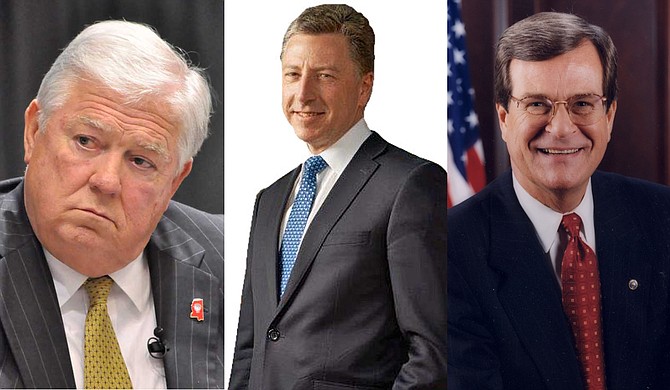
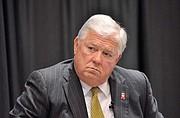

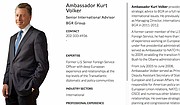
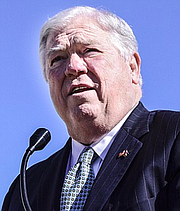
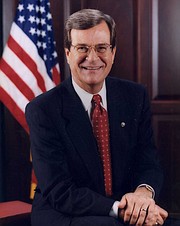
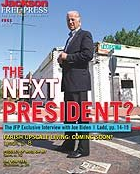
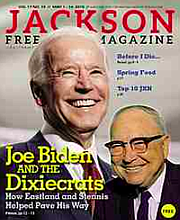

Comments
Use the comment form below to begin a discussion about this content.
comments powered by Disqus